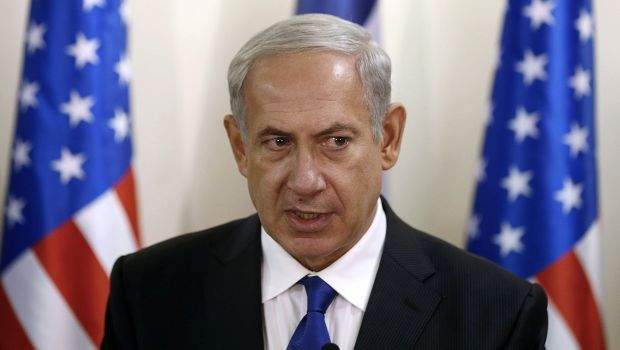
Israeli Prime Minister Benjamin Netanyahu addressing journalists during a press conference with US Secretary of State John Kerry at the prime minister’s office in Jerusalem on September 15, 2013. (AFP Photo/Pool/Larry Downing)
Ramallah and Cairo, Asharq Al-Awsat—The Palestinian–Israeli peace process is expected to enter a critical phase this week, with President Obama expected to attempt to persuade the two parties to reach an agreement on an interim framework for talks drawn up by the US.
Obama will meet Israeli Prime Minister Benjamin Netanyahu on Monday and is scheduled to meet Palestinian President Mahmoud Abbas on March 17.
Netanyahu left for Washington on Saturday for the meeting with Obama, who is trying to persuade both leaders to sign a framework agreement which is being formulated by US Secretary of State John Kerry in a bid to launch talks for a final settlement, using the framework agreement as a reference for contested issues.
Palestinian sources, speaking on condition of anonymity, told Asharq Al-Awsat: “This time Obama will intervene strongly and directly and will pressure Netanyahu and Abbas to accept the framework agreement.”
The sources added that the agreement is expected to include a clause on a capital of a Palestinian state in East Jerusalem, in return for Palestinian concessions in other issues related to borders and refugees.
The issues of borders, refugees, settlements and water resources are expected to be included in appendices to the agreement which will be discussed by joint committees. The issue of the Jewish identity of Israel, which Netanyahu’s government insists must be recognized, is categorically rejected by the Palestinians, according to the sources.
The sources added: “If Obama succeeded in persuading Netanyahu and Abbas to make concessions on the framework agreement, he would announce a date to sign the agreement in Washington, in his presence.”
Israeli sources revealed that Obama will ask Netanyahu and Abbas about their future plans in case of the failure of the negotiations, and will give them the option to cooperate with the American plan, or face isolation and live with the difficult reality which awaits them if the US abandoned the peace process.
Netanyahu continues to insist on Palestinian recognition of the Jewish identity of the state of Israel, and the presence of Israeli troops in the Jordan Valley, as well as rejecting the division of Jerusalem. Netanyahu also wants to adjust West Bank borders to integrate large Israeli settlements into Israeli territory, and rejects the return of refugees.
Palestinians insist on the sharing Jerusalem and refuse to recognize Israel as a Jewish state—which they see as precluding any return of Palestinian refugees to what is now Israeli territory—and also insist on the removal of all Israeli forces from the Jordan Valley.
It is likely that Obama’s efforts will be focused on Jerusalem and a declaration of the Jewish identity of Israel, in order to find a compromise.
Senior Palestinian sources, speaking on condition of anonymity, told Asharq Al-Awsat that the way to resolve the crisis would be to announce that Jerusalem was the capital of both states, with an indication to Israel’s right to acquire international recognition as a Jewish state, which would implicitly also mean the recognition of the state of Palestine.
Kerry previously said both parties had the right—after signing the framework agreement—to object to, or express reservations about, any articles and have them registered, in an attempt to resolve the dilemma of Jerusalem and national identity.
Palestinian Chief Negotiator Saeb Erekat and Palestinian intelligence chief, Majed Faraj, will travel to Washington in the next few days to meet American officials in preparation for the Abbas visit. Erekat and Faraj are expected to meet Secretary of State Kerry and Middle East Envoy Martin Indyk.
Palestinians say Obama’s intervention, despite its great importance, would not be the last step, as John Kerry still had until the end of April to present a reasonable framework agreement. The sources said that “if Kerry failed by then, the Palestinian leadership will meet to decide on the next step.”
According to the sources, the Palestinian leadership has a “Plan B” in place for Palestine to seek membership of international organizations and institutions. This plan is rejected by Israel and the US, and Israel may respond by a unilateral withdrawal from the West Bank, which will cause the Palestinians a political, security and financial crisis.
Meanwhile, Egyptian Foreign Ministry spokesperson Badr Abdelati told Asharq Al-Awsat that Cairo received information from the Palestinian side that the “differences were still deep and have yet to be bridged.”
He added that Egyptian Foreign Minister Nabil Fahmi had a meeting with a member of Palestinian Fatah movement, Azzam Al-Ahmad, who informed him of the developments in the negotiations.
Ahmad said the meeting came within the framework of coordination with the Egyptians in order to make unified decisions on the negotiations ahead of the Abbas–Obama meeting.
In a related issue, assistant secretary for Palestine and the occupied Arab territories at the Arab League, Ambassador Mohammad Sabih, said Erekat would meet Arab League Secretary-General Nabil Elaraby soon to inform him about details of the Palestinian–Israeli negotiations in light of the recent meeting between Abbas and Kerry in Paris.
Mohammad Hassan Shaaban contributed reporting from Cairo.

As someone who is keenly interested in what is happening in the Middle East, I want to thank you for presenting this article in a straightforward, non-biased manner.
Both Israelis and Palestinians have issues that they and no one else have to resolve. They have to trust each other, and there is little of that now.